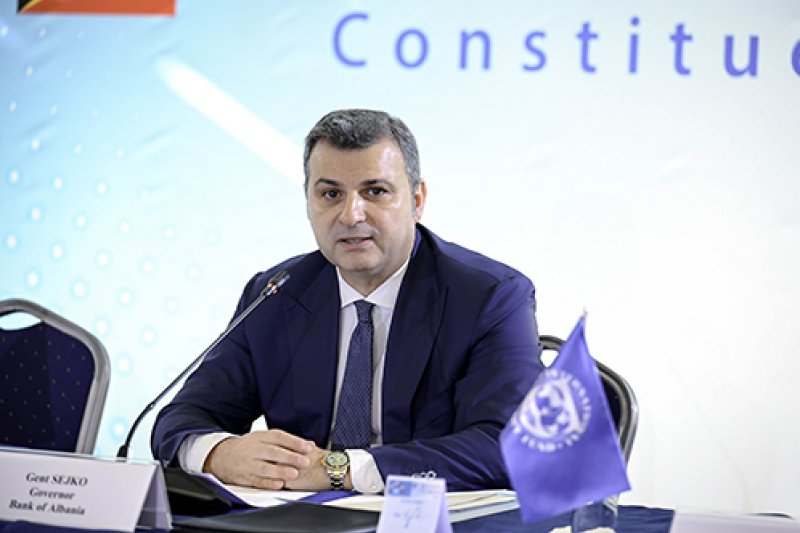BoA: Low Productivity Growth, Population Aging and Labor Force Constraints, New Challenges
Dear Prime Minister,
Dear Ministers of Finance and fellow Governors,
Allow me, first of all, to welcome you to this annual meeting of our joint Constituency in the International Monetary Fund and the World Bank, a meeting which takes place in the new premises of the Bank of Albania.
Also, I would like to emphasize that it is a special pleasure for us - I speak here also on behalf of the Minister of Finance of Albania - to have the opportunity to welcome the opening of the works of this event, under the guise of the host country.
Dear participants,
The economic reality of recent years has been challenging. The pandemic of 2020-2021 and the economic consequences of Russia's military aggression against Ukraine have been quite serious. However, I believe that I express a common opinion when I emphasize that the resistance of our economies and societies to them has been admirable. In particular, in the face of a global context characterized by the rapid growth of prices, uncertainty and financing costs, we have managed to ensure positive rates of economic growth, employment and wages, we have made progress in reducing inflation, and we have maintained the general economic and financial stability of our economies.
Albania is also part of this encouraging narrative. The year 2023 ended with economic growth around 3.5%, an unemployment rate at historic lows, as well as a foreign debt, public debt and non-performing loan indicators below pre-shock levels. In particular, inflation was halved during the past year, going down to the level of 4%, while the health indicators of the banking sector remain positive. A surprise of 2023 was the increase in the interest of foreigners in our country. Albania welcomed around 10 million visitors, climbing to the third place in the world for the fastest growing tourism and registering – for the first time in its history – a current account surplus. Also, the year 2023 is well on its way to being the year with the highest level of foreign direct investments, proving once again the attractiveness of Albania as an investment destination.
The Bank of Albania has contributed to this success story. We have timely addressed the increase in inflation, starting the path of a gradual and careful normalization of the stance of our monetary policy. In full coherence with it, the supervision and careful regulation of the banking sector and the continuous investment in the development of the payment system, in the innovation and digitization of financial services, have contributed to the development of the financial sector and strengthening the stability of the country.
Albania's perspective remains positive. However, the experience of recent years has taught us that setbacks and challenges, no matter how distant they may seem, will not be absent in the future either. At this point, let me broaden the scope of the discussion somewhat. For a long time now, low productivity growth, the effects of population aging and labor force constraints are becoming increasingly important factors in the development of the economies of our Constituency. Also, geopolitical fragmentation and the effects of climate change are becoming challenges of the present.
But what do these challenges mean for us as policy makers? The answer is as straightforward as it is complex: we must ensure economic and financial stability, create a more efficient, innovative and inclusive economy, as well as invest in the green and digital revolution. Let me be a bit more specific.
- First, as a central bank, we must take the fight against inflation to the end. Its downward trend is good news, but falling inflation is not inflation on target. Therefore, central banks should continue to focus on taking the necessary measures to return inflation to the target, as a prerequisite for the sustainable growth of economies and the well-being of citizens.
- Second , we must insist on rebuilding the fiscal spaces in time, in order to be as prepared as possible for facing future shocks. Thirdly, financial policies should continue to have a double focus: on the one hand, encouraging financial progress in function of increased efficiency and, on the other hand, early handling of risks to financial stability, through a regulation of the supervision of careful.
- Finally, structural policies should be increasingly oriented towards fostering sustainable growth. In the world and European context, in the face of a complex geopolitical reality, we must work to maintain - as far as possible - economic integration and free markets of products, labor and capital, as a process that has brought progress visible to all actors involved. In parallel with them, internal structural reforms should focus on supporting innovation, on continuous training and retraining of the workforce, as well as on stimulating the green transition and the technological revolution. Meanwhile, developing countries like Albania should focus on closing infrastructure investment gaps and creating a more stimulating environment for promoting domestic and foreign investments.
Dear Ministers of Finance and fellow Governors,
In closing this welcome speech, I would like to thank you once again for your participation, as well as express my conviction that this discussion forum will help us devise more efficient and coordinated approaches to the development of our countries.













